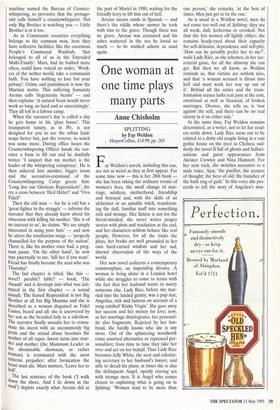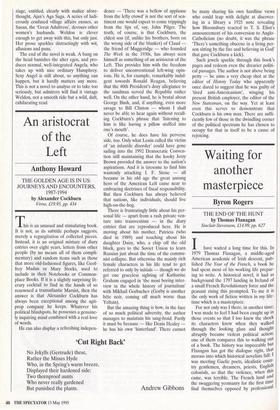One woman at one time plays many parts
Anne Chisholm
SPLITTING by Fay Weldon . HarperCollins, £14.99, pp. 265 Fay Weldon's novels, including this one, are not as weird as they at first appear. For some time now — this is her 28th book she has been taking the ordinary events of women's lives, the small change of mar- riage, adultery, motherhood, friendship and betrayal and, with the skills of an alchemist or an amiable witch, transform- ing the dull, familiar stuff into something rich and strange. Her fiction is not for the literal-minded; she never writes proper stories with plots and resolution at the end, and her characters seldom behave like real people. However, for all the tricks she plays, her books are well grounded in her own hard-earned wisdom and her sad, shrewd observation of the ways of the world.
Her new novel concerns a contemporary commonplace, an impending divorce. A woman is living alone in a London hotel while she struggles to come to terms with the fact that her husband wants to marry someone else. Lady Rice, before she mar- ried into the landed gentry, was a pop star, Angelica, rich and famous on account of a song entitled-`Kinky Virgin'. She gave away her success and her money for love; now, as her marriage disintegrates, her personal- ity also fragments. Rejected by her hus- band, she hardly knows who she is any more. Out of the splintering woodwork come assorted alternative or repressed per- sonalities; from time to time they take her over and act on her behalf. Thus Lady Rice becomes Jelly White, the neat and calculat- ing secretary to her husband's lawyer, and able to derail his plans; at times she is also the delinquent Angel, openly craving sex with strange men. It is Angel who comes closest to explaining what is going on in Splitting: 'Women tend to be more than one person,' she remarks, 'at the best of times. Men just get to be the one.'
As is usual in a Weldon novel, men do not come too well out of Splitting: they are all weak, dull, lecherous or crooked. Not that she lets women off lightly either; she remains beady-eyed about their capacity for self-delusion, dependence and self-pity. `How can he possibly prefer her to me?', wails Lady Rice, as she schemes, in her sec- retarial guise, for all the alimony she can get. But then we all know, as Weldon reminds us, that victims are seldom nice, and that 'a woman scorned is thrust into hell and must work her way up out of it'. Behind all the antics and the trans- formation scenes lurks real pain at the cost, emotional as well as financial, of broken marriages. Divorce, she tells us, is 'war against the self, and there .can be no real victory in it on either side.'
At the same time, Fay Weldon remains determined, as a writer, not to let her read- ers settle down. Lady Rice turns out to be related to a dotty old couple living in a vast gothic house on the ;fiver in Chelsea; sud- denly the novel Tull of ghosts and halluci- nations and guest appearances from Aleister Crowley and Nina Hamnett. For her next trick, she switches narrators to a male voice, Ajax, 'the purifier, the scourer of thought; the hero of old; the banisher of the bath ring of guilt.' In this voice she pro- ceeds to tell the story of Angelica's mar- riage, entitled, clearly with malice afore- thought, Ajax's Aga Saga. A series of ludi- crously confused village affairs ensues, as Susan, the 'Great Adultress', devours other women's husbands. Weldon is clever enough to get away with this, but only just. Her prose sparkles distractingly with wit, allusions and puns.
The end of the novel is weak. A bang on the head banishes the alter egos, and pro- duces normal, well-integrated Angela, who takes up with nice ordinary Humphrey. Sexy Angel is still about, so anything can happen, but it hardly matters any more. This is not a novel to analyse or to take too seriously, but admirers will find it vintage Weldon, not a smooth ride but a wild, daft, exhilarating read.



































































 Previous page
Previous page